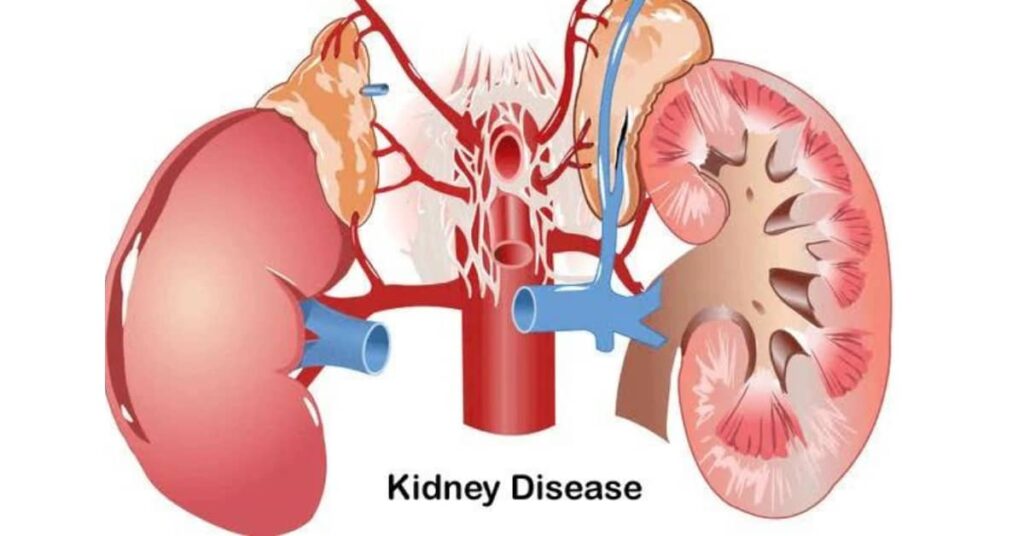Contents
- 1 What is Kidney Disease?
- 2 Types of Kidney Disease
- 3 Diabetic Kidney Disease (Diabetic Nephropathy)
- 4 Causes of Kidney Disease
- 5 How Diabetes Affects Kidneys?
- 6 Kidney Disease Symptoms
- 7 Kidney Disease Diagnosis
- 8 Treatment of Diabetic Kidney Disease
- 9 Ways To Keep Your Kidneys Healthy
- 10 Conclusion
- 11 Conclusion
What is Kidney Disease?
The kidneys are one of the most vital organs of the human system. The failing of kidneys leads to kidney disease. On a hot summer day, when we drink a lot of water to keep ourselves hydrated, we feel the urge to go to the washroom, again and again.
Do you know what’s behind it? It is our Kidneys. They are responsible for 4 major functions of a human body:
- Regulating the fluid levels,
- Monitoring the amount of waste removed or to be removed from the body,
- Keeping a track record of the passage of vitamins and minerals.
- Formulating the hormonal discretions and balancing in the body.
The primary function is to dispose of the waste products from the body. Eight liters of the total blood in the body pass through the kidneys between 20-25 times a day, which implies that kidneys filter 180 liters of blood in 24 hours. This is why kidneys need to function properly all day long.
Types of Kidney Disease
Kidney diseases are of several types depending on the cause and the speed of their growth. Some of them are:
Chronic Kidney Disease
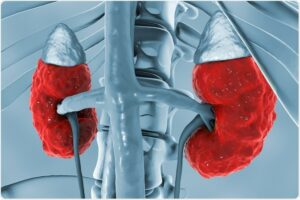
It is one of the most common kidney diseases, and its major cause is high blood pressure. As we know that constant blood processing is one of the kidneys major and they need to work on about 20% off the total volume of blood every minute. And so the high pressure in the blood flow is dangerous for kidneys, specifically to glomeruli which is the functional unit kidney.
Kidney Stone
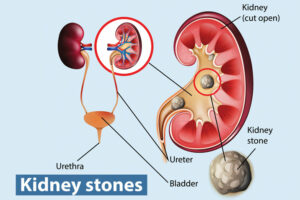
We eat a variety of food. Minerals and other substances in the blood accumulate kidneys and form small and solid particles called Kidney stones. In minor cases, Doctors recommend drinking as much water as you can so that the stone flushes out through the urine.
However, depending upon the size of the stone, they also suggest you operate and extract out the stones from your kidneys.
Glomerulonephritis
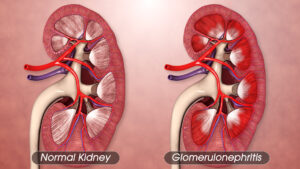
It is the name of an inflammation caused in the functional unit of the kidney called glomeruli. The function of the glomerulus is to filter the blood. The disease Glomerulonephritis can be the cause of certain infections drugs, autoimmune and congenital disorders.
Polycystic Kidney Disease
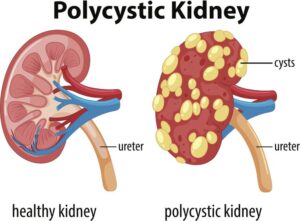
Usually, kidney cysts are harmless but Polycystic kidney disease is a way more serious condition. basically, a genetic disorder that causes this to grow on the surface of the kidney or inside it.
Urinary Tract Infection
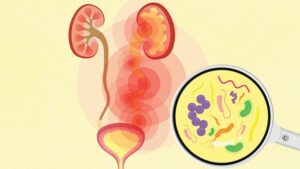
This can occur in any part of your urinary system and it occurs due to some bacterial infections. Two of the most common parts in which it occurs are the bladder and urethra.
So there are some easy treatments available for it but in case it is left untreated the infection can proceed towards the kidney and lead to kidney failure also.
Diabetic Kidney Disease (Diabetic Nephropathy)
Diabetic Kidney Disease is a kidney disease that occurs as a result of one of the complications of diabetes. Kidneys are relatively more prone to damage when a person has diabetes.
Stages of Diabetic Kidney Disease
There are 4 stages of DKD or Diabetic Nephropathy categorized on the basis of Glomerular Filtration Rate (GFR). GFR is nothing but the most important function that your kidneys need to perform, which is to filter the blood. Usually, in a normal body kidneys have a GFR of 100. The kidneys’ functions happen to decrease in Diabetic Kidney Disease, so the stages of damage are:
Stage 1: It is the gentle and merciful stage of the disease where the kidneys can be restored for their proper functioning through treatment. At this stage, the GRF is above 90%
Stage 2: The damage to the kidney is moderate and GFR is 60%. At this stage, the doctor does not diagnose kidney disease.
Stage 3: When GFR of 15-60%, kidney disease is diagnosed.
Stage 4: If the GFR goes below 15%, then it’s a complete kidney failure.
Causes of Kidney Disease
The fist-sized organ, kidney needs many of the factors to be placed to function systematically. Here are some of the major causes of kidney disease:
Acute Kidney Disease Causes
It is a condition when your kidneys stop working all of a sudden. The other name for it is acute kidney injury or acute renal failure. The causes to its can be:
- Lack of blood flow to the kidneys
- Acute damage to the kidneys
- Urine stored up in kidneys
- Traumatic injury
- Too much protein in the bloodstream, as a result of breakage in muscle tissue or dehydration
- Sepsis, a serious infection
- Blocking of urine flow due to enlarged prostate
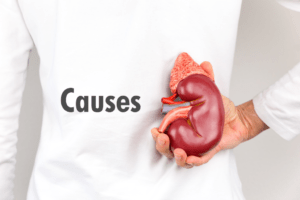
- Complications during pregnancy such as eclampsia and preeclampsia
- Autoimmune diseases
- Liver failure
Chronic Kidney Disease Causes
Now, this is a kidney disease where your kidneys have not been working well for the last three months or more. The symptoms may not appear in the early stages. But the saddest part is that it is a simple situation where it can be treated. The main causes are:
- High blood pressure
- Diabetes
- Immune system disease
- Urinary tract infection
- Inflammation
- Polycystic Kidney disease
- Drugs and toxins
How Diabetes Affects Kidneys?
When diabetes hits a person, kidneys are adversely affected too. Priorly, if you are a diabetic, three of your internal organs will be affected:
- blood vessels,
- nervous system,
- and urinary tract.
Let’s understand them one by one:
Blood vessels run throughout our body and have a lot to do with the kidneys too. They act as the filtering units of kidneys. Any sort of obstruction and clogging in the working of blood vessels can cause kidney damage which can be a fatal action.
For a diabetic, fluctuations in blood sugar level make the blood vessels narrow and hamper their elasticity. Due to this, less blood and oxygen gets supplied throughout the body. This increases the risk of high blood pressure and damage to blood vessels.
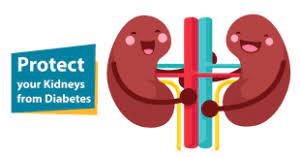
The nervous system is spread throughout the body to regulate the process of sending and receiving messages to the different parts. Diabetes can cause big harm to the nerves in the kidneys as high blood sugar levels (hyperglycemia) cause injury to them.
Damage caused to your nerves from diabetes can leave them unable to receive messages from your brain.
For instance, if the nerves are unable to send the message about a full bladder to your brain then the pressure from a full bladder can cause damage to your kidneys.
Diabetes is a leading cause of Urinary tract infections, sexual dysfunction, and various other issues related to the bladder.
If the urine in the bladder stays there for longer it can lead to different urinary tract infections because of the bacteria in the urine. It also has a negative impact on the sensory functioning of the body.
Kidney Disease Symptoms
When it comes to symptoms, they do not appear at the initial stage. And you will only be able to look for them once the disease has reached its advanced rate. You might notice:
- High blood pressure
- Loss of appetite
- Weakness
- Fatigue
- Nausea and vomiting
- Sleep issues
- Muscle twitches and cramps
- Stubborn itchiness
- Shortness of breath
- Chest pain
- Confusion
- Metallic taste in your mouth
Prevention of Kidney Disease
Reduce the risk of developing diabetic kidney disease by:
- Regulating your diabetes: If your diabetes is being regulated properly or if you are managing your high blood sugar levels, then the chances of developing Kidney Disease decreases.
- Managing your blood pressure: keeping your blood sugar level close to normal is very important because and regulated high blood pressure contributes a lot more to kidney diseases
- Being careful with over-the-counter medicines: people often rely on painkillers such as aspirin, Advil, Motrin, and some others when they are going through muscle cramps or even a headache. but they hardly know the ill effects of such types of non-prescription pain relievers. You must have a look at the instructions given on the packages of such medicine. Moreover, if you are already a diabetic patient taking such kinds of medicines can result in even worse conditions for you.
- Managing your weight: Being overweight or obese is never favorable for your body conditions and their functions. This is one of the key routes from where almost every ailment takes birth. Indulge into some weight loss activities on a daily basis and keep Count On Your calories. make sure you are burning the number of calories you are taking in.
- Quitting smoking: Cigarette smoking is injurious to health. It’s no secret to any of us. This causes damage to your Kidneys and if you already have a pre-existing Kidney Disease you better look for ways or strategize for quitting smoking. There are some support groups counseling and medications out there that help you quit smoking
Kidney Disease Diagnosis
First, the doctor will inquire about your family medical history. Then, he might ask if you are urinating more than normal. Only then, he will move forward with some physical exams.
Acute Kidney Disease Diagnosis
- Blood tests, which will indicate the number of waste products in your blood. It is used to detect the level of two substances, namely urea, and creatinine, responsible for kidney functions
- Urine tests, to detect the condition of the kidney.
- Imaging tests, to let doctors see your kidneys. These include ultrasound and computerized tomography
- Kidney Biopsy, which is a lab testing of kidney tissues to know about the problems.
Chronic Kidney Disease Diagnosis
- Completes Blood Count to detest anemia. Kidneys produce erythropoietin, a hormone. This helps your bone marrow to create red blood cells. In case of severe damage to the kidneys, erythropoietin is not produced sufficiently.
- Electrolyte level test:
In CKD, the level of potassium increases, and the level of bicarbonate decreases. This increases the level of acid in the blood.
- Blood Urea Nitrogen and Creatinine Test
When your kidneys start to fail, urea nitrogen and creatinine in the blood elevates.
Some of the tests used in acute kidney disease are also used here for diagnosing CKD, such as Ultrasound, scanning and imaging tests.
Some other tests are:
- Abdominal CT scan
- Abdominal MRI
- Bone density test
Treatment of Diabetic Kidney Disease
When it comes to the treatment of diabetic Kidney Disease there are no permanent fixes for it. but there are ways through which you can bring your blood sugar levels down in order to decrease the inflammation in the Kidneys.
In case the state of your Kidneys keeps getting progressively worse and you reach end-stage renal disease a Sadi then the doctor might suggest invasive treatments like dialysis.
Medications for Kidney Disease
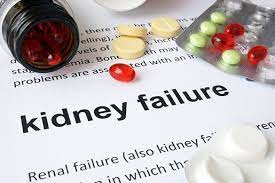
Using the recommended dosage of insulin and maintaining the blood sugar levels close to normal can help with diabetic nephropathy. If you have a family history of Kidney Disease then you must keep up with your doctor’s appointment and take precautions to prevent yourself from the world.
Dialysis For Kidney Disease
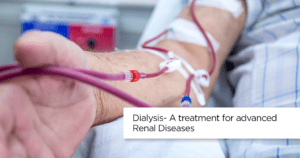
In some unfortunate cases, it gets worse with time and the patient suffers from ESRD, that is, end-stage renal disease. At this stage, there are only two options left in front of the patient either to go for dialysis or for a kidney transplant. The doctor will suggest the right course of treatment for your disease.
Dietary and Lifestyle change diabetes is either a consequence of or asymptomatic of obesity. and weight reduction is the only option left before the patients. and this will change your health and body function for good.
It’s true that you cannot completely eradicate the damage that has already been done but you can make sure that there is no distress caused to your kidney.
Ways To Keep Your Kidneys Healthy
Below are some of the key points that can keep that fist-sized organ, kidney healthy.
- stay fit and active
- keep your blood sugar level is close to normal
- monitor your blood pressure level
- have the habit of drinking plenty of fluids
- monitor your weight to have a healthy BMI
- don’t smoke
- better avoid otc ( over the counter) pills
- have regular screening for your Kidneys.
Conclusion
Here we have reached the end. All you need to know is that it is your body and it will be you taking care of it lifelong. You need to be very sure about the impact that certain edible things are going to put on your body. The wisest option is to make a balanced diet chart for yourself and make a note of everything that helps you in a positive manner. More importantly, you should be aware of the methods by which you can monitor your sugar level timely. Hope you ended up having a productive time reading the above article about blood sugar levels. Check out our site if you are looking for kidney stone treatment.
Conclusion
Do you want to get rid of diabetes? Join our online diabetes consultation program and reverse your Diabetes naturally through lifestyle changes such as a Personalized Diet plan, Exercise, dieticians, and health coaches.
